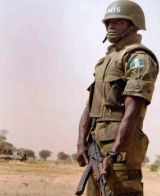Sudan says no foreign troops without its consent
May 7, 2006 (KHARTOUM) — Khartoum has indicated it may be ready to accept UN peacekeepers taking over from African Union troops in Darfur following a peace deal between the government and the main rebel movement.
 The announcement on Sunday coincided with a visit to Darfur by UN envoy Jan Egeland, who is the first high-ranking UN official to visit the war-torn region since a peace deal was signed Friday in Abuja.
The announcement on Sunday coincided with a visit to Darfur by UN envoy Jan Egeland, who is the first high-ranking UN official to visit the war-torn region since a peace deal was signed Friday in Abuja.
“The government will assess whether or not it will need the assistance of foreign troops and it may decide to ask for a UN deployment,” foreign ministry spokesman Jamal Ibrahim said.
“But such a decision is the prerogative of the government… What is sure is that no foreign forces will come to Sudan without the consent of the government.”
Although the spokesman stopped short of saying that Khartoum would request a deployment of UN troops in place of the existing AU force, his statement marked a softening of the government’s position.
President Omar al-Beshir has spoken out strongly and repeatedly against any UN deployment in Darfur, insisting that the peacekeeping mission should be carried out by Africans not outsiders.
“We are strongly opposed to any foreign intervention in Sudan and Darfur will be a graveyard for any foreign troops venturing to enter,” the president said as recently as February in response to US-led calls for a UN force to take over.
But in recent days, a number of government officials have raised the possibility of a UN deployment within the framework of a peace accord with the rebels, prompting a strong welcome from Washington.
“We view this as a very encouraging sign, the first positive outcome from the Abuja peace agreement,” US ambassador to the United Nations John Bolton said Saturday.
Ahead of Friday’s signing ceremony in Abuja, North Darfur Governor Osman Yussef Kibir had said the government might approve a UN force to oversee implementation of a peace deal.
“We believe that the deployment of UN forces in Darfur after a peace accord is concluded can serve as a guarantee to implementation of the accord,” Kibir told reporters last week.
An audio tape of Al-Qaeda supremo Osama bin Laden broadcast by Al-Jazeera television two weeks ago called for a holy war against the West in Darfur, in allusion to the US-led calls for a NATO-backed UN force.
“I call upon the mujahedeen (holy warriors) and their supporters in Sudan and its surroundings — including the Arabian Peninsula — to prepare to lead a prolonged war against the crusader robbers in western Sudan,” bin Laden said in the recording, which US officials later said they regarded as genuine.
Only the largest faction of the main rebel group — the Sudanese Liberation Movement — signed Friday’s agreement to end the three-year-old conflict.
A smaller faction of the SLM and another rebel group have yet to sign up, but the partial agreement marked a major breakthrough in the AU-sponsored peace talks.
UN relief coordinator Egeland was greeted by a handful of protestors rejecting “international interference” when he stepped off his plane in Nyala in South Darfur.
But Egeland insisted maximum pressure was needed to prevent more tragedies.
“At the moment Darfur is slowly being strangled, it’s dying in front of us,” he told the BBC from Darfur.
“Half of the population now has become war victims… so I believe, yes, we are turning the corner, but the whole world has to put pressure on the parties,” said Egeland, who is due to meet officials in Khartoum on Monday.
Since ethnic minority rebels in Darfur launched an uprising against the Arab-dominated regime in Khartoum in early 2003, up to 300,000 people have died of the combined effect of war and famine.
What US President George W. Bush’s administration has described as “genocide” has also left some 2.4 million displaced, including some 200,000 in neighbouring Chad, which is also torn by civil strife.
Some 7,000 AU peacekeepers are currently deployed in Darfur but they have failed to stop the bloodshed amid a lack of resources to patrol a region the size of France or Texas.
(ST)
